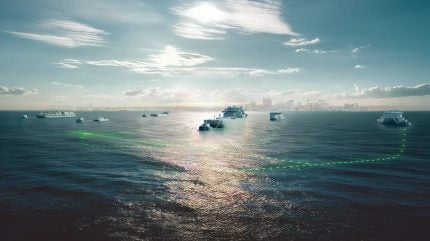
Maersk subsidiary Stillstrom has entered into a memorandum of understanding (MoU) with the Panama Canal Authority (ACP) to assess the application of its offshore charging technology to decrease emissions from vessels idling in the vicinity of the Panama Canal.
As part of this collaboration, Stillstrom and ACP will undertake a joint feasibility study to evaluate the potential implementation of offshore charging systems in the region.
This study will focus on assessing how these technologies could contribute to emissions reduction, enhance air quality, and align with the Panama Canal’s overarching decarbonisation objectives.
ACP deputy administrator and chief sustainability officer Ilya Espino de Marotta said: “At the Panama Canal, we recognise that bold innovation is essential to decarbonising global shipping.
“This collaboration with Stillstrom reflects our commitment to exploring cutting-edge solutions that reduce emissions not only in transit, but throughout the entire maritime logistics chain.”
The Panama Canal, which accommodates around 14,000 vessels each year, plays a vital role in global trade.

US Tariffs are shifting - will you react or anticipate?
Don’t let policy changes catch you off guard. Stay proactive with real-time data and expert analysis.
By GlobalDataTraditional practices for ships waiting to transit or anchored near coastal areas often involve the use of diesel or heavy fuel oil generators, resulting in the emission of CO2, NOx, and particulate matter.
In contrast, Stillstrom’s offshore charging technology proposes a solution where vessels can draw power from a stationary offshore unit, eliminating the need for fossil fuel consumption while they await transit, thereby reducing noise and air pollution.
Stillstrom CEO Kristian Borum Jorgensen said: “This partnership exemplifies the direction the maritime industry needs to take – embracing innovation to directly address the environmental impact of vessel operations.
“By implementing offshore power and charging solutions, we’re not only reducing CO2 emissions but also creating a pathway to cleaner air, cleaner seas, and a more sustainable future for global shipping.”
In recent years, the ACP has implemented various initiatives to promote decarbonisation, including incentive programmes for vessels with lower emissions, investments in water conservation projects, and a commitment to reducing its carbon footprint.
Last month, ACP announced the launch of the NetZero Slot on 5 October 2025, offering dedicated transit for ships with low carbon emissions. This initiative supports the maritime industry’s decarbonisation efforts and aims for net zero emissions by 2050.



